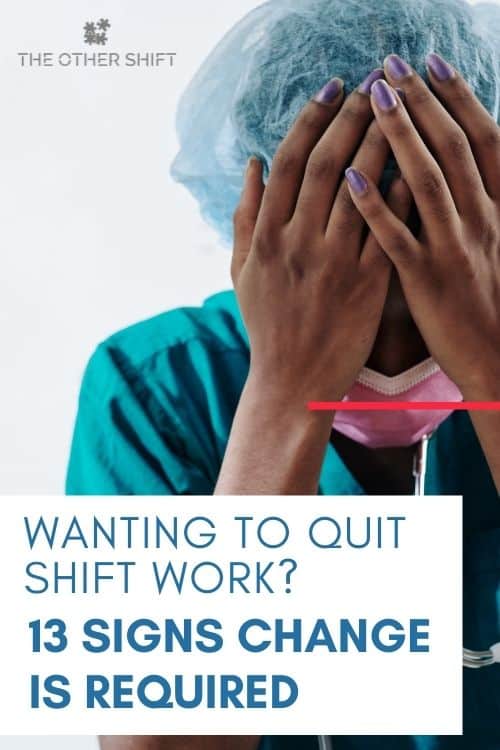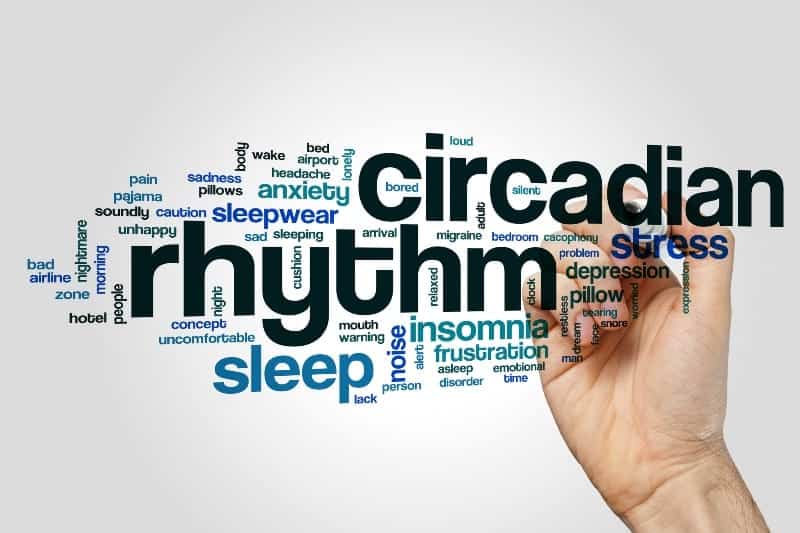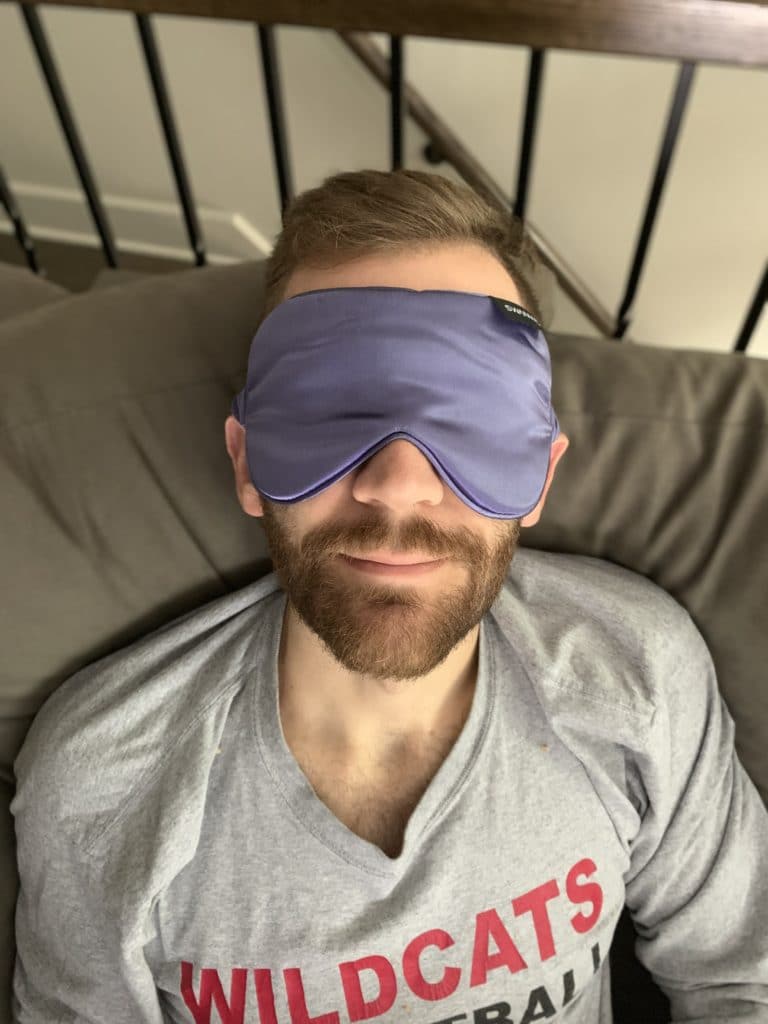Disclosure: This page may contain affiliate links, meaning we receive a commission if you decide to make a purchase through our links, but this is at no additional cost to you. Please read our disclosure and privacy statement for more info.
When you first started shift work, you envisioned this; improved income levels, increased shift differentials, avoid traffic jams, no people overload from your day job and sunbathing in the afternoon after completing your daily chores before the kids arrived home from school. Though possible, your good intentions fizzled and you’re now energy depleted, life feels like you only work, eat and sleep and you’re contemplating quitting. What are the clear signs you might be ready for a change?
The common stressors that cause people to want to quit shift work include; impact on diet, working against your body clock, weight gain, overall health, family & relationships, sleep, burnout, and a lack of sun exposure. If left unchecked, these stressors can cause lasting implications on your daily life.

Now, we established this website to assist the millions of people who work a rotating roster. However, you might be at a point you just can’t do it anymore and change is a must. So let’s look at the signs of potential impacts from shift work to determine correlations that might exist between your working hours and the detrimental, life-altering effects you’re experiencing. This article intends to equip you with the knowledge to make an informed decision about quitting shift work.
1. Irregular Diet and Feeling Bloated Continuously
Your family is home sleeping. It’s 2 am and you’re hungry. You think you should be sleeping, too, but instead, you’re working. Every night you plan to bring healthy snacks to work, but more sleep or chores or I’ll get healthy nuts out of the vending machine, assures you it isn’t necessary.
When hunger and sleepiness threaten to take over your body, you buy chips and chocolate and coffee. The caffeine will help you stay awake. It’s still working when you get home. You can’t sleep, and the snacks you consumed a few hours ago didn’t sustain you, so you cook. And then you eat a big breakfast of eggs, bacon, home fries, toast loaded with butter, and juice to get your vitamin C. Sleepiness soon takes over, and you go to bed on a full stomach.
Digestive problems are common in shift workers due to disruption of the body clock (circadian rhythm) and poor diet.
2. Disrupted Circadian Rhythm
The body clock, also known as the circadian rhythm, is a 24-hour biological cycle that occurs individually in every cell of the body, driving daily rhythms in our physiology, from when we sleep, to hormone levels, to how we respond to medication.
Our body clock is synchronized with the surrounding environment by exposure to daylight and the timing of meals. This synchrony is important for long-term health, and it is well known that disrupting your circadian rhythm by shift work or travel across time zones can be detrimental for health. Importantly, it is thought that eating at unusual times, as often occurs during shift work and jet lag, is a major cause of body clock disruption (source).
You now stuggle to sleep and function effectivly as a human being.

3. I’m A Hazard To Other Drivers
When shift workers are exhausted and sleepy, they often reach for the comfort of food. However, shift workers are eating at a time when the body is primed to be asleep and processes involved in digesting food works differently at night. This means the impact of eating at night may be very different, potentially much worse, than when eating in the day.
In this pilot study, people who ate a large meal drove significantly worse than those who did not eat. They were seven times more likely to crash and had difficulty sticking to the speed limit and staying in their lane. They also felt sleepier and reported more bloating compared to those who did not eat at all.
Mmm, lasagna … It’s an option you might want to avoid on the night shift, as it’s contributing to added strain on the body.
4. Weight Gain is Creeping Up on Me
Since you began your night-shift job, you’ve needed a new wardrobe year after year as your clothes seem to shrink and your body won’t stop expanding. Could shift work be the problem?
Your circadian rhythms are physical, mental, and behavioral changes impacted by light and darkness. Naturally, these rhythms influence sleeping and waking hours, hormone releases and other bodily functions.
Switching to the night shift can easily disrupt your circadian rhythm, and if you’re not sleeping enough, that can lower your metabolic rate.
If your body isn’t secreting a sufficient amount of serotonin and dopamine due to whacked out sleep schedules, it tries to find a way to compensate, often times through sugary foods. Your natural food cravings and hunger become interrupted. Sweet foods will give you an alternate source of serotonin and dopamine, but it also will give you an excess amount of calories.
A lack of proper sleep also causes a release of cortisol, which is also referred to as the stress hormone. This has a direct correlation with weight gain in the abdominal area (source).
Related: Does Shift Work Make You Fat? 14 Tips to Avoid Weight Gain
5. The Increase Risk of Cardiovascular Disease Scares Me
With the added strain placed on the body from working all different hours, there’s been multiple studies that have strongly linked shift work and a 40% increased risk of cardiovascular disease compared with day workers. There is also evidence showing that individuals who have performed over six years of shift-work duties are at higher risk of developing cardiovascular disease.
The exact mechanisms by which shift work causes cardiovascular disease are still not completely understood, but it is thought that the main contributing factors include disturbed circadian rhythms, and confounding factors such as smoking, poor eating habits, and social problems causing stress. (source)
Related: Does Night Shift Shorten Your Life? 10 Impacts of 3rd Shift
6. I Crave a Normal Metabolism
Your weight gain is out of control, and for some, you’ve been diagnosed with type 2 diabetes.
Night-shift sleep patterns have been linked to certain metabolic disorders, such as obesity and diabetes.
You wake up, feel hungry, and fall asleep each day around repeating 24-hour “circadian” cycles controlled by your body’s internal clocks. These clocks are synchronized by a central pacemaker in the brain. Cycles of light and dark are important for the function of the brain’s master clock. Other cycles, such as the behavioral activities of eating and fasting or sleeping and waking, are important for peripheral clocks in the liver, gut, and other tissues.
So when you stay awake all night or otherwise go against natural light cycles, your metablosim has no consistent way of knowing when to kick in or switch off. The long-term disruption of this has major flow on effects which may impact your health for years to come. (source)
[VIDEO] – Are Night Shifts Bad For You? Stop Them Ruining Your Health
7. My Gut Hurts (All The Time!)
Is your upset stomach, nausea, diarrhea, constipation, or heartburn interfering with your quality of life? These gastrointestinal symptoms are another way your body fights back when you work against its internal clock.
Shift workers are frequently reporting and experiencing more gastrointestinal issues over the regular day worker counterparts. Think problems like abdominal pain, gas, diarrhea, constipation, nausea, vomiting, change in appetite (either increased or decreased), indigestion, heartburn and even ulcers.
Poor diet and changes in sleeping patterns seem to be the main culprit here, with some of the findings listed below;
- Working when you are normally asleep disrupts gastrointestinal motility and secretory functions involved in digesting food. The GI system works by the body’s circadian clock and functions poorly when food is eaten at the “wrong” time.
- Fatigue could lead to stress and its negative effects.
- Changes in immune system functioning may enhance the growth of unhealthy organisms.
- The poor selection of foods available during late hours can also contribute.
8. I’m Desperate to Support My Immune System
It’s suggested that regular disruption of your circadian rhythm can impact your immune responses may enhance infection susceptibility. So if you’re constantly finding yourself sick when working a rotating roster and you’re not able to recover or shake the illness, it could be that working roster is the culprit.
Correspondingly, the studies on shift work and infection susceptibility in humans report a higher incidence and severity of respiratory infections in shift workers compared to non-shift workers (source). So in the current climate we live where respiratory infections are over running our hospitals, this is a potential risk of working nights that you must be aware of.
Related: How Can I Boost My Immune System When Working Night Shift?

9. Regain Hormonal Balance
One of the many functions negatively impacted by sleep deprivation is the regulation of the appetite hormones ghrelin and leptin. Ghrelin activates hunger; leptin suppresses it. When you’re sleep deprived, your levels of leptin decrease and ghrelin increase, making you hungry. On top of that, you’re exhausted.
When you’re famished and tired, you’re more likely to reach for high-carbohydrate, high-sugar snacks to fuel you through the energy lull. You’ll probably also reach for salt and fat since your body needs these to send the “I’m full” signals to the brain. (source)
Because your hunger hormones are at the wrong levels due to lack of sleep, you’re likely to overeat all these fatty, high-calorie foods, consuming larger or more frequent portions than you would when you’re rested. Unless you have a miraculously fast metabolism, this inevitably leads to weight gain.
10. I Want to Become Close Again With Family & Friends
Your spouse arrives home at 5:30 pm and relieves you of watching the kids as you get a few hours of sleep before you head out to your night job. On the weekends there are household chores to catch up on. Then it’s Sunday night again and you’re off to work for another week. There’s limited time for family, friends, or date nights. You play a never-ending game of catch-up on your sleep.
Do you feel out-of-synch with the rest of the world? Working and sleeping odd hours can make you feel isolated and cut off from family and friends.
More on relationships in this video – Shift Work and Family. A Practical Guide For Busy Parents

11. I Don’t Want Shift Work Sleep Disorder (SWSD)
Shift work schedules go against most peoples’ internal body clocks or circadian rhythms. SWSD causes difficulties adjusting to a different sleep/wake schedule, which results in significant issues with falling asleep, staying asleep, and sleeping when desired. About 20% of the fulltime workforce in the United States is involved in some form of shift work.
Related: Shift Work Sleep Disorder (SWSD) – What Is It and How to Avoid It?
What are the symptoms of shift work sleep disorder (SWSD)?
The most common symptoms of SWSD are difficulty sleeping and excessive sleepiness. Other symptoms associated with SWSD can include difficulty concentrating, aches and pains, headaches or lack of energy.
Not every shift worker suffers from SWSD. It is estimated that 10% to 40% of shift workers have SWSD.
What are the consequences of shift work sleep disorder (SWSD)?
Increased likelihood of:
- Accidents and work-related errors.
- Irritability or mood problems.
- Poor coping skills and impaired social functioning.
- Health related complaints — including gastrointestinal, cardiovascular, and metabolic problems.
- Drug and alcohol dependency.
Even if you do decide to give away shift work, these sleep aids I’m wearing below really help us!
12. Lack of Sun Exposure
The lack of Vitamin D, particularly when absorbed through the skin (sunlight exposure) is wreaking havoc on shift workers bodies. Following is a list of disorders that are directly linked to Vitamin D deficiency. The list is long, and it is concerning:
Obesity, Metabolic Disorder, Mood Disorders, Schizophrenia, Cardiac Disease, High Blood Pressure, Prostate Cancer, Dementia, Depression, and Osteoporosis
Researchers found that shift-workers, particularly first responders, health care workers and indoor workers are at a high risk of developing vitamin D deficiency due to reduced outdoor time and sunlight exposure. (source)
Related: How to Get Enough Vitamin D When Working Night Shift

13. I’m Burnout
Job burnout is a form of work-related stress wherein a person feels physical or emotional exhaustion involving reduced productivity, loss of personal identity, and the inability to accomplish tasks.
It is a medical diagnosis and a syndrome that results from chronic work-related stress, which affects the worker’s health and well-being.
The World Health Organization (WHO) reports that burnout is a syndrome caused by chronic workplace stress that has not been successfully managed. Several physical and mental health symptoms may accompany the condition.
If left unaddressed, it can make it hard for the individual to function well and perform their daily activities.
Signs of Job Burnout
| Exhaustion | At the end of your shift, are you too tired to do anything enjoyable with family and friends? Do you have trouble sleeping, experience memory problems, poor concentration, and physical pain? |
| Decreased Productivity and Quality of Work | Do you submit your assignments late or miss deadlines? Do you work hard but feel like you don’t accomplish enough? |
| Frequent Mistakes | We all make mistakes, but repeated mistakes that are out of character for the worker is a sign of job burnout. |
| Sick Days | Have your sick days increased on your shift work schedule? Stress can take a toll not only on mental health but also on your physical health. Stressing too much, lack of sleep, tiredness, and lack of rest may cause several health problems, including frequent headaches, cardiovascular disease, increased bouts of flu and colds, stomach issues, heart palpitations, dizziness, and drowsiness. |
| Irritability | Workplace tension and stress can result in a clash of personalities. Employees may not get along with others well due to irritability, which can also stem from job burnout. Being irritable may signal that a person is under a lot of pressure, feelings of being ineffective or unimportant, or the loss of efficiency at work. |
| Cynicism | Cynicism is also called depersonalization, wherein workers may have negative or inappropriate attitudes towards customers, clients, loss of idealism, irritability, and withdrawal. It may also affect one’s trust in their coworkers or supervisors. Being cynical can negatively impact productivity levels, causing reduced personal accomplishment, low morale, and the inability to cope. |
Health Consequences of Job Burnout
Over 66 percent of full-time workers experienced burnout at work, and about 23 percent felt it frequently. Also, 63 percent of the employees are more likely to have a sick day, 23 percent are at risk of visiting the emergency room, 13 percent are less confident in their performance, and burned-out workers are 2.6 times as likely to resign from their current employer.
The pandemic has also contributed to these feelings since the change in work shifts, additional work due to infection control measures, and work-from-home setups.
It is well-known that workplace stress can take a toll on one’s mental and physical health. A study published in the journal PLOS ONE found that job burnout can cause physical health outcomes such as cardiovascular diseases and the risk factors for these diseases, including hyperlipidemia, obesity, type 2 diabetes, metabolic syndrome, hypertension, and abnormal lipid profiles.
The researchers also identified other health impacts such as musculoskeletal disorders, including back pain, neck-shoulder pain, pain-related disability, and unexplained tiredness or fatigue.
Meanwhile, the psychological impacts of job burnout included insomnia, sleep disturbances, and depressive symptoms. Further, burnout was also a predictor of being admitted to the hospital due to mental disorders.
Related: Shift Work Burnout: Causes, Red Flags and How to Beat It
Shift work can have detrimental effects on your health, relationships, and survival. Some people cope with shift work better than others, but if your quality of life is compromised beyond what is acceptable to you — and you believe the signs point to shift work as the instigator — give in to your body’s demands and find a day job. Recover your life.
Cheers,

Disclosure: This page may contain affiliate links, meaning we receive a commission if you decide to make a purchase through our links, but this is at no additional cost to you. Please read our disclosure and privacy statement for more info.
2 thoughts on “Wanting to Quit Shift Work? 13 Signs Change is Required”
Leave a Reply
Recent Posts
An examination of the night shift professions, that while sometimes underappreciated, are necessary for civilization, in its current form, to exist. A city can be thought of as a machine. Each...
Culminated from an exhaustive yet well-funded journey into the night, this article will prepare you for life outside of work while being a denizen of the dark. During days off, night shift...




????????????I am reading this past 2 AM. and missed my nightshift! My brain and body just said FU…unbeknowest to me! I hope I will find another more balanced employment but the health, while not totally screwed, is somewhat compromised. I don’t have to much of a choice now but I recognize the signs and symptoms of burnout and SWSD. This is what I needed to read as it is all true but when you do know and then read it…different effect! How long does it take to get back from shift disorder-that might make doing dayshifts hard?! Thank you for the post
Hi Liz,
Thanks for your comment and honesty. Our jobs are brutal sometimes! Please know you’re not alone. If you’ve ever got a question or something you want to talk about, feel free to send us an email at [email protected]. Happy snoozing.